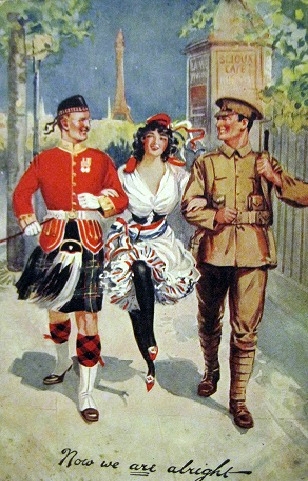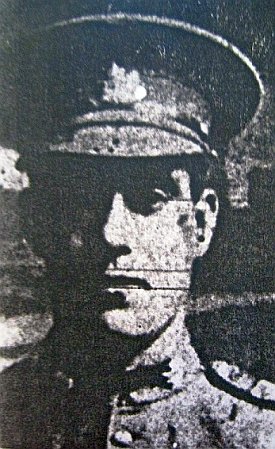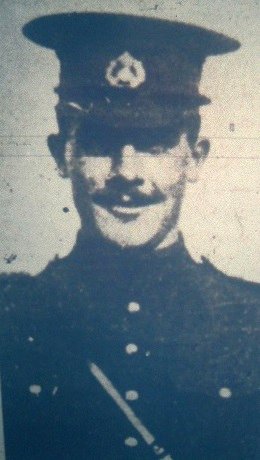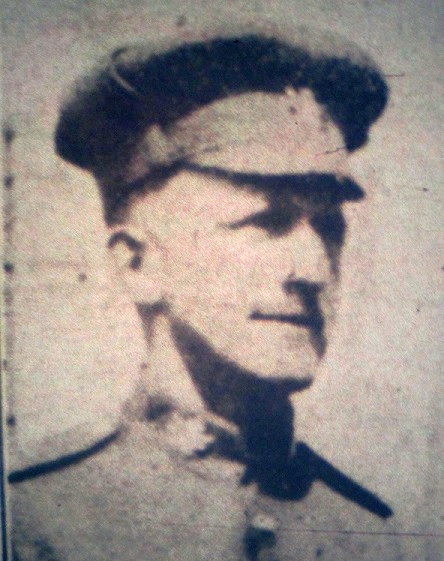Results for ‘WAR Stories’
This Story as Told by Dr. Ryall, of Hamilton, A Surgeon of the 13th Battalion.
[Welland Telegraph, 5 June 1891]
Twenty five years ago Tuesday the battle of Ridgeway was fought in this county, and the following narrative published some time ago in the Hamilton Spectator, although it relates more particularly to the movements of the Thirteenth Battalion, will never the less at this time be very interesting to TELEGPAPH readers.
The first day of June, 1866, was a beautiful summer morning, when my father called me from peaceful slumber, saying that there must be some unusual excitement in the city as he heard the bugle call repeated several times. He then called my two step-brothers, both of whom were members of No.4 company. One was a private, the other carried a bugle. They started then, for the first time, that the battalion had received orders at the previous drill to assemble immediately at call of the bugle. We went down to the armory and there learned that the Thirteenth was under marching orders to repel the raiders. The battalion responded quickly to the call. Those members who were absent on business from the city joined their companions as speedily as possible. Two officers were absent who did not participate in the engagement. Although rumors of hostile intentions were rife, the most remote idea of a Fenian invasion never occurred to me. At that time I had not fully made up my mind to remain a member of the battalion, but when the order to march came I had to proceed in civilian costume, having neglected to procure the necessary military outfit.
The Thirteenth had been drilling for a considerable period and was in excellent order. The general appearance of the battalion was better than it has been for several years since, although it did contain at that time a few members who would scarcely have passed a medical examination. The men were as efficient in drill as indoor drill could make them. They were also fairly equipped for the service which they were supposed then to perform, and which I presume was expected to consist of a few hours’ pleasure excursion. I don’t think that a single member of the regiment from the colonel down ever expected to hear a shot fired on that occasion. Read the rest of this entry »
J. BARRATT WOUNDED
Hit in the Arm with Shell Fragment
[Welland Telegraph, 6 June 1916]
Will Go back to France. However J. Barratt of Welland, an employee of George T. Wright, was wounded in action on May 1st, by being hit on the arm with a shrapnel fragment. Fortunately he will not lose the arm and he is now resting nicely in a hospital in Aberdeen, Scotland.
In a letter to Mr. Wright dated May 16, he says:-
“I guess you will be wondering why I have not written before. I have been back in England two weeks now. I got wounded on the first of May. A piece of shrapnel hit me on the arm, and it went in to the bone. I had to have an operation to get it out. So I was lucky enough to get back to England. I am in Aberdeen, Scotland, at the hospital, and expect to leave this week to go home on sick leave and then go back to France.
We were in a heavy bombardment when I got wounded. The Germans put over every kind of shell they had. By the time they finished we had no trenches or dugouts left. At night they came over to see who did not get back alive. Well I do not know which address to give you just now, because I shall be moving around. I will let you know when I get settled again.”
PRIVATE WILBERT DACK
[Submitted by B, November 2014]
This is a postcard I recently purchased. No postmark.
Private Dack, son of James King Dack and Effie Hewitt, was born in Leeds, Ontario.
 Dear Florence- I hope you are enjoying your self this winter. I hope I will be home soon now as the war is over and I like to get back to see you and all the rest. I suppose you like to know what we are doing well not much but still doing a little. Our board is a lot better now. I don’t think I will be home until June or July but I like to be home by the 24 of May so I could spend the day with you. I will close for this time. Dear Florence- I hope you are enjoying your self this winter. I hope I will be home soon now as the war is over and I like to get back to see you and all the rest. I suppose you like to know what we are doing well not much but still doing a little. Our board is a lot better now. I don’t think I will be home until June or July but I like to be home by the 24 of May so I could spend the day with you. I will close for this time.
Pte. Wilbert Dack
# 309439
6th Canadian Reserve Battalion
Seaford Camp
Sussex England
xxxxxx |
[Welland Telegraph, 4 July 1916]
The 176th battalion was notified on Thursday afternoon to go into camp at Camp Borden tomorrow. As a consequence the barracks at Welland, Niagara Falls, Thorold and St. Catharines will be vacant after tonight.
Lieut.-Col. Sharpe, who went to Algonquin Park to recuperate, was summoned home on Friday. He should really have had a longer rest for he is not yet fully recovered but came back to superintend the moving into camp.
All Welland should turn out in full force to give the boys a hearty send-off.
[Welland Telegraph, 4 July 1916]
The departure of the 98th battalion this week to complete their training will touch more homes in the county than any other event since the beginning of the war. It is our first complete battalion and its officers and men are from our own soil.
It is a matter of regret that Welland will not see the battalion on their trip to the east. The boys will go by special train to Niagara Falls on the Michigan Central, and their train will then be transferred to the Grand Trunk to go through St. Catharines and Hamilton.
The city of Niagara Falls is arranging to give the battalion an ovation in which Welland will participate. Mayor Crow and other prominent men will be present to say good-bye officially.
The ladies of Niagara Falls will give to each soldier an elaborate lunch and the city will present tobacco and other gifts.
The Telegraph is not permitted to state when the battalion will leave or its destination.
LORNE SCHRAM A PRISONER IN GERMANY
[Welland Telegraph 4 July 1916]
Mr. and Mrs. George Schram, in a letter r eceived yesterday morning from their son, Pte. Ray Schram, now in England with 86th Machine Gun battalion, learned that their son, Lorne, had been taken prisoner by the Germans. In view of the fact that they had not heard from the boy since May, they had grown to fear that something had happened. Mrs. Schram, who has long been an invalid, was quite overcome on receipt of the letter Monday morning and her condition is critical. A third son, Leland, only the night before had said good-bye to his parents, preparatory to departure for overseas with the 98th.
Lorne, who is a marksman of the first water, went to the front with the Mounted Rifles and was soon given a post as sniper. Because of his skill with the rifle he made a success of his position, and when he went out of action a month ago he had many German scalps to his belt.
All Welland has good wishes for the young man and for the home where proud and loving hearts await his return.
Former Wellander Killed
15 May 1890-12 September 1916
[People’s Press, 26 September 1916]
Word was received on Saturday by Henry Hederick from Mr. and Mrs. J.W. Tate, 69 Lakeview Ave. Toronto, announcing that their second son, Mervin Tate, had been killed in action in France. The family were residents of Welland town for about 15 years, during which time Mr. Tate was employed by M. Beatty & Sons. Ten years ago they moved to Toronto. Mervin Tate, who was about 26 years old, had only been in the trenches a short time. His younger brother, Fred, who was born in Welland, has been in the trenches as a sniper for some months. Mr. and Mrs. Tate will have the sympathy of their many friends here in the loss of their noble son.
[Welland Telegraph, 30 May 1916]
 This a picture of Charles H. Osborne who was wounded in action on April 23rd and who on the day following gave up his life for his country. He was born at High Barnett Hertfordshire, England, with his wife he came to Canada three years last March. For ten months he was employed by the Hamilton Sewer Pipe Company, then he came to Welland to join the furnace staff of the Union Carbide Co. He enlisted in Welland on the 24th of last July and left for Niagara Camp on July 27 to join the 76th battalion. He joined with the battalion on the first day of October. After a winter spent at Shorncliffe he had gone on the firing line only six weeks before he was wounded. He had two brothers and two nephews wearing the ? colors so the Osborne family was well represented.
This a picture of Charles H. Osborne who was wounded in action on April 23rd and who on the day following gave up his life for his country. He was born at High Barnett Hertfordshire, England, with his wife he came to Canada three years last March. For ten months he was employed by the Hamilton Sewer Pipe Company, then he came to Welland to join the furnace staff of the Union Carbide Co. He enlisted in Welland on the 24th of last July and left for Niagara Camp on July 27 to join the 76th battalion. He joined with the battalion on the first day of October. After a winter spent at Shorncliffe he had gone on the firing line only six weeks before he was wounded. He had two brothers and two nephews wearing the ? colors so the Osborne family was well represented.
Private Osborne leaves a widow in Welland and a handsome manly son aged three years. As a husband and father he was an exemplary man and the summons of death has left a great loss in the home that he adorned.
*Note: According to his military records Charles died on April 23rd, the same day he was wounded by shrapnel and is buried Vlamertinghe, Military Cemetery, Belgium.
Capt. Reilly Makes Trip From Aviation Camp at Beamsville
Machine Landed in a Buckwheat Field North of Billings & Spencer Plant
[Welland Telegraph, 7 August 1918]
 Capt. J.R. Reilly, though he had already some records to his credit, made a new one on Saturday when he came to Welland from the aviation camp at Beamsville by airplane. Capt. Reilly is the first passenger ever landed at Welland from the air (exclusive of course, of these small passengers brought by the stork).
Capt. J.R. Reilly, though he had already some records to his credit, made a new one on Saturday when he came to Welland from the aviation camp at Beamsville by airplane. Capt. Reilly is the first passenger ever landed at Welland from the air (exclusive of course, of these small passengers brought by the stork).
Inspector Godfrey, who is in active service, felled a number of Hun planes and two observation balloons, was in charge of the machine. They rose 500 feet above the Beamsville camp and were then able to see the smoke cloud of Welland twenty miles away. The highest altitude they reached was 3000 feet, from which vantage point they could see Lake Ontario, Lake Erie, and the shining waters pouring over Niagara Falls.
Reaching Welland, difficulty was found in getting a place to land. Ball’s farm, northwest of the city was tried, but did not present a favorable spot. The aviators next hovered over the fair ground, but so many poles are on the grounds that they thought it best not to risk a landing.
Finally they found an area on the White farm, north of Billings-Spencer plant. They came down in a nice soft field of buckwheat.
Capt. Reilly got out and later Instructor Godfrey rose to the heavens and made a bee-line for Beamsville.
In the days when we all travel by airplane, and when out mail, express and freight are brought that way, we must remember that Capt. Reilly was the first passenger of the skies to reach this city.
SERGT. HARRY BEST KILLED IN ACTION
Eldest Son of Reeve W.J. Best of Welland
His Service on the Field Had Been Rewarded by Promotion and He Was Just About to Leave for England to Take Lieutenant’s Course
[Welland Tribune, 12 June 1917]
 LETTER OF SYMPATHY
LETTER OF SYMPATHY
At the meeting of the county council on Friday morning, Reeve Steele made feeling reference to the bereavement that had fallen upon Reeve Best, and moved that the council stand adjourned until afternoon as a mark of sympathy and respect for Mr. Best. The motion was carried and a committee was appointed consisting of the Warden and others to draft a suitable letter of sympathy to Mr. and Mrs. Best.
Sergt. Harry Best, elder son of Reeve W.J. Best and Mrs. Best, was killed in action on May 22nd.
Such was the information conveyed in an official telegram from Ottawa on Friday morning.
In his death there is an added tragedy. Brig.Gen. Hill had recommended him for a three months’ absence in England where he was to take out his papers as lieutenant. A fine recognition of his services in the field. At the last moment he was asked to go up the line once more. In the fort-night following he lost his life.
Harry Best will be gratefully remembered by Welland as a young man who made good. Engaged on the customs staff, he might have taken shelter in his employment, but like his brother, Frank, he early chose to follow the flag. He had the ability and his heart was right, so it is not strange his service has been splendid.
His parents and brother and sister have the very sincere sympathy of many friends in the great loss they have sustained. Harry was born in Welland and was 30 years of age last October. He joined the 76th battalion, spent the summer and autumn at Niagara and the first winter in Barrie and at Easter time last year, went overseas.
Frank was severely wounded in October last, losing one eye and having his left arm permanently incapacitated. When he was released from hospital he joined the Army Corps pay office and he is still on duty.
In a letter written May 4th, Harry Best said:- “I have good news for you. Some days ago I was called to Brigade headquarters and was questioned by the Brigadier, who was from Niagara Falls (Brig, Gen Hill.) After looking over my papers and coming to my name and address, he looked me over and said, “Are you the son of Billy Best.” The Brigadier signed the papers, and just as soon as they go through Division, I go to England for a three months’ course for a lieutenant’s stars. What do you think of that? “There’s sure strange things happening in France these days.”
Harry and Frank Best enlisted with the 76th battalion in 1915, going overseas in April 1916. Both were corporals, but when they went to France in July 1916, they gave up their stripes. In September, both were again awarded the corporal’s stripes for carrying in wounded and carrying up rations. In the battle in October when Frank was so badly wounded, Harry won his sergeant’s stripes. Apparently his conduct on the Vimy Ridge battle won a lieutenancy for him as described in the letter quoted above. He had not asked for the promotion.
Following the battle of Vimy he wrote, “My how you all must have worried while our boys were in the thick of one of the greatest battles of the war, and I am sure, that through the dark hours, even though all your loved ones were in danger, nevertheless, that thrills of pride will course through every true Canadian’s veins whenever mention is made of the our lads’ dashing victory.”
The last letter received from him, dated May 14, stated that he had again gone up the line the day before, though apparently he had expected to leave for England before that.
In a letter of May 8, he says:- “We are out of the line for a time and will have a good rest. The weather could not be finer. Today we had a gentle shower and everything growing took on a greener shade. It’s just fine to be able to be about to enjoy the invigorating scenery. One evening before leaving the forward area we went to a wood where daffodils were growing in profusion. These we dug up in patches of soil and took them to the final glorious resting place. We miss the lads, but what is more grand than the thought that they have fought the good fight and have only gone ahead. They live in our memory, the grass and flowers grow around about and the birds sing overhead. They are only resting-our honored dead.”
Now the writer lies in his “final glorious resting place.” In that silent company there will be none who have done their duty with greater courage and valor. It would seem almost as if this letter had been written with the intention of preparing his parents for the news that was so soon to follow.
Robert Harry Best is buried at Petit-Vimy British Cemetery, Pas de Calais, France.
 Subscribe..
Subscribe..
 Dear Florence- I hope you are enjoying your self this winter. I hope I will be home soon now as the war is over and I like to get back to see you and all the rest. I suppose you like to know what we are doing well not much but still doing a little. Our board is a lot better now. I don’t think I will be home until June or July but I like to be home by the 24 of May so I could spend the day with you. I will close for this time.
Dear Florence- I hope you are enjoying your self this winter. I hope I will be home soon now as the war is over and I like to get back to see you and all the rest. I suppose you like to know what we are doing well not much but still doing a little. Our board is a lot better now. I don’t think I will be home until June or July but I like to be home by the 24 of May so I could spend the day with you. I will close for this time.
 This a picture of Charles H. Osborne who was wounded in action on April 23rd and who on the day following gave up his life for his country. He was born at High Barnett Hertfordshire, England, with his wife he came to Canada three years last March. For ten months he was employed by the Hamilton Sewer Pipe Company, then he came to Welland to join the furnace staff of the Union Carbide Co. He enlisted in Welland on the 24th of last July and left for Niagara Camp on July 27 to join the 76th battalion. He joined with the battalion on the first day of October. After a winter spent at Shorncliffe he had gone on the firing line only six weeks before he was wounded. He had two brothers and two nephews wearing the ? colors so the Osborne family was well represented.
This a picture of Charles H. Osborne who was wounded in action on April 23rd and who on the day following gave up his life for his country. He was born at High Barnett Hertfordshire, England, with his wife he came to Canada three years last March. For ten months he was employed by the Hamilton Sewer Pipe Company, then he came to Welland to join the furnace staff of the Union Carbide Co. He enlisted in Welland on the 24th of last July and left for Niagara Camp on July 27 to join the 76th battalion. He joined with the battalion on the first day of October. After a winter spent at Shorncliffe he had gone on the firing line only six weeks before he was wounded. He had two brothers and two nephews wearing the ? colors so the Osborne family was well represented. Capt. J.R. Reilly, though he had already some records to his credit, made a new one on Saturday when he came to Welland from the aviation camp at Beamsville by airplane. Capt. Reilly is the first passenger ever landed at Welland from the air (exclusive of course, of these small passengers brought by the stork).
Capt. J.R. Reilly, though he had already some records to his credit, made a new one on Saturday when he came to Welland from the aviation camp at Beamsville by airplane. Capt. Reilly is the first passenger ever landed at Welland from the air (exclusive of course, of these small passengers brought by the stork). LETTER OF SYMPATHY
LETTER OF SYMPATHY